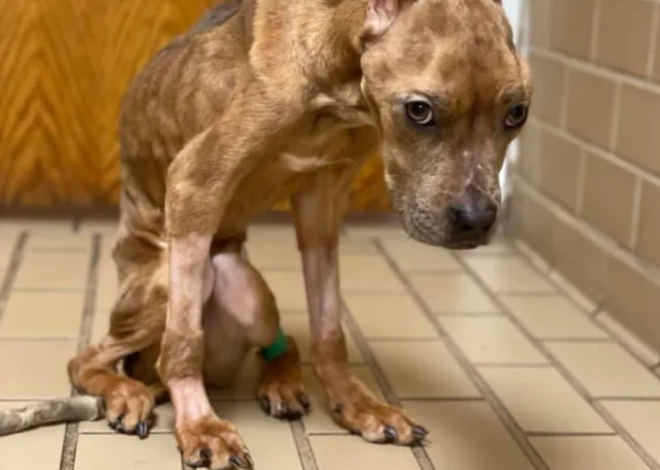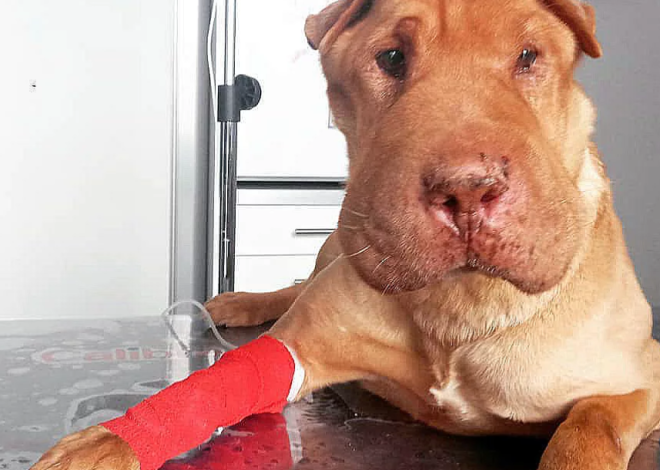
Coping with Canine Facial Swelling: Daisy the Yellow Labrador Retriever’s Battle and Recovery
When you picture a Yellow Labrador Retriever, you probably imagine a friendly, energetic dog with a wagging tail and a big, goofy grin. These loyal and loving dogs are known for their exuberant personalities and gentle nature. But for one Yellow Lab named Daisy, her usual joy was replaced by pain and discomfort when she developed severe facial swelling that left her family worried and unsure of what to do.
The Sudden Onset of a Frightening Condition
Daisy had always been a healthy, happy dog. At five years old, she was the heart of her family, bringing endless joy and companionship to everyone around her. However, one morning, Daisy’s family noticed something wasn’t right. Her usually sleek and smooth muzzle was noticeably swollen, making her face look puffy and distorted. Worse still, Daisy appeared to be in significant discomfort, frequently pawing at her face and whimpering softly.

Daisy’s family quickly became alarmed. The swelling seemed to have appeared almost overnight, and they had no idea what could have caused it. Was it an allergic reaction? An insect bite? Or something more serious? Concerned for their beloved pet, they rushed her to the veterinarian, hoping for answers and, more importantly, relief for Daisy.
The Vet’s Diagnosis: A Complex Challenge
Upon examination, the veterinarian confirmed that Daisy was indeed suffering from severe facial swelling, primarily concentrated around her muzzle. The vet noted that the swelling was likely causing Daisy significant pain, as the inflamed tissues were pressing against her sensitive facial nerves.
The possible causes for Daisy’s condition were numerous. Allergic reactions, infections, abscesses, insect bites, or even trauma could all lead to facial swelling in dogs. The vet began a series of tests to determine the underlying cause, including blood work, X-rays, and a thorough examination of Daisy’s oral health.
After careful analysis, the vet suspected that Daisy might have been bitten by an insect or stung by a bee, leading to an acute allergic reaction. However, given the severity of the swelling, the vet also wanted to rule out the possibility of an underlying infection or abscess that could be causing the inflammation.
Treatment: A Multi-Pronged Approach
With the diagnosis in hand, the vet recommended a comprehensive treatment plan to alleviate Daisy’s symptoms and address the root cause of her swelling. The treatment involved a combination of medications, including antihistamines to reduce the allergic reaction, anti-inflammatory drugs to decrease the swelling, and antibiotics to prevent or treat any potential infection.
Daisy was also given pain relief to make her more comfortable as the swelling subsided. The vet instructed Daisy’s family to monitor her closely over the next few days, watching for any signs of improvement or, conversely, any worsening of her condition.
Daisy’s family was relieved to have a plan in place, but they couldn’t help but feel anxious as they watched their beloved dog struggle with her discomfort. They followed the vet’s instructions meticulously, administering her medications on schedule and keeping a close eye on her as she rested at home.
The Road to Recovery: Daisy’s Journey Back to Health
Over the next few days, Daisy’s family began to notice gradual improvements in her condition. The swelling around her muzzle started to decrease, and she seemed less distressed, spending more time resting comfortably. Daisy’s appetite slowly returned, and she began to show interest in her surroundings again, wagging her tail and responding to her family’s comforting words.
The most significant sign of progress came when Daisy stopped pawing at her face and returned to her usual routine of play and affection. Her family was overjoyed to see the light return to her eyes as she resumed her favorite activities, from fetching her ball to snuggling up on the couch.
Though the recovery process was gradual, Daisy’s resilience shone through. Her family’s love and dedication, combined with the vet’s expertise, helped her overcome this frightening and painful experience. In time, Daisy was back to her old self—happy, healthy, and full of life.
Lessons Learned: What to Do If Your Dog Experiences Facial Swelling
Daisy’s story is a reminder of how quickly a seemingly minor issue can escalate into a serious health concern for our pets. If you notice sudden facial swelling in your dog, it’s crucial to seek veterinary care as soon as possible. Early intervention can prevent complications and ensure that your pet receives the necessary treatment to recover fully.

Here are some key steps to take if your dog shows signs of facial swelling:
- Seek Immediate Veterinary Care: Don’t wait to see if the swelling goes down on its own. Prompt medical attention is essential.
- Monitor for Additional Symptoms: Take note of any other symptoms your dog may be experiencing, such as difficulty breathing, lethargy, or loss of appetite, and report them to your vet.
- Follow the Vet’s Treatment Plan: Administer any prescribed medications as directed and closely follow your vet’s instructions for care.
- Keep Your Dog Comfortable: Make sure your dog has a quiet, comfortable place to rest while they recover. Provide soft, easy-to-eat foods if their mouth is sore.
- Stay Observant: Continue to monitor your dog’s progress, and don’t hesitate to contact your vet if you notice any changes in their condition.
A Happy Ending for Daisy
Thanks to the swift actions of her family and the expert care of her veterinarian, Daisy made a full recovery. Her experience with facial swelling was a scary chapter in her life, but it also strengthened the bond between Daisy and her family. Today, she continues to bring joy and love into their lives, her bright eyes and wagging tail a testament to the love and care that helped her through a difficult time.
Daisy’s story is a reminder of the importance of vigilance, quick action, and unwavering love when it comes to our pets. We may not always be able to prevent every health issue, but with the right care and attention, we can help our furry friends overcome even the toughest challenges.



